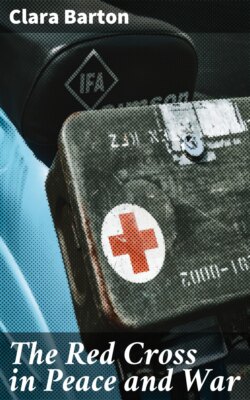Читать книгу The Red Cross in Peace and War - Barton Clara - Страница 22
На сайте Литреса книга снята с продажи.
ACTION OF THE GOVERNMENT OF THE UNITED STATES.
ОглавлениеTable of Contents
The president of the American Red Cross, Clara Barton, in November, 1881, laid before President Arthur the matter of the Treaty of Geneva, and the unfulfilled desire of President Garfield that the United States should give its adhesion to that international compact. To this President Arthur gave a cordial and favorable response, and made good his words by the following paragraph in his first annual message, sent to the forty-seventh Congress:
At its last extra session the Senate called for the text of the Geneva Convention for the relief of the wounded in war. I trust that this action foreshadows such interest in the subject as will result in the adhesion of the United States to that humane and commendable engagement.
This part of the message was immediately taken up in the Senate and referred to the Committee on Foreign Relations, consisting of the following named gentlemen, to wit: William Windom, Minnesota; George F. Edmunds, Vermont; John T. Miller, California; Thomas W. Ferry, Michigan; Elbridge G. Lapham, New York; John W. Johnston, Virginia; J.T. Morgan, Alabama; George H. Pendleton, Ohio; Benjamin H. Hill, Georgia.
During the consideration of the subject an invitation was extended to the president of the American Association, its counsel and other associate members to meet the above named Senate Committee at the capitol, for conference, and for an explanation of such points as still remained obscure, to aid their deliberations, and to facilitate investigations.
On the seventeenth of May, 1881, Hon. Omar D. Conger submitted to the United States Senate the following resolution, which was considered by unanimous consent and agreed to:
Resolved, That the Secretary of State be requested to furnish to the Senate copies (translations) of Articles of Convention signed at Geneva, Switzerland, August 22, 1864, touching the treatment of those wounded in war, together with the forms of ratification employed by the several governments, parties thereto.
On the twelfth of December, 1881, in response to the above resolution, President Arthur addressed to the Senate a message transmitting a report of the Secretary of State, with accompanying papers, touching the Geneva convention for the relief of the wounded in war, which message, report and accompanying papers were as follows:
(Senate Ex. Doc. No. 6, 47th Congress, 1st Session.)
Message from the President of the United States, transmitting in response to Senate resolution of May 17th, 1881, a report of the Secretary of State, with accompanying papers, touching the Geneva convention for the relief of the wounded in war.
December 12, 1881.—Referred to the Committee on Foreign Relations and ordered to be printed.
To Senate of the United States:
I transmit herewith, in response to the resolution of the Senate of the seventeenth of May last, a report of the Secretary of State, with accompanying papers, touching the Geneva convention for the relief of the wounded in war.
Chester A. Arthur,
Executive Mansion,
Washington, December 12, 1881.
To the President:
The Secretary of State, to whom was addressed a resolution of the Senate, dated the seventeenth of May, 1881, requesting him “to furnish to the Senate copies (translations) of Articles of Convention signed at Geneva, Switzerland, August 22, 1864, touching the treatment of those wounded in war, together with the forms of ratification employed by the several governments, parties thereto,” has the honor to lay before the President the papers called for by the resolution.
In view of the reference made, in the annual message of the President, to the Geneva convention, the Secretary of State deems it unnecessary now to enlarge upon the advisability of the adhesion of the United States to an international compact at once so humane in its character and so universal in its application as to commend itself to the adoption of nearly all the civilized powers.
James G. Blaine.
Department of State,
Washington, December 10, 1881.
